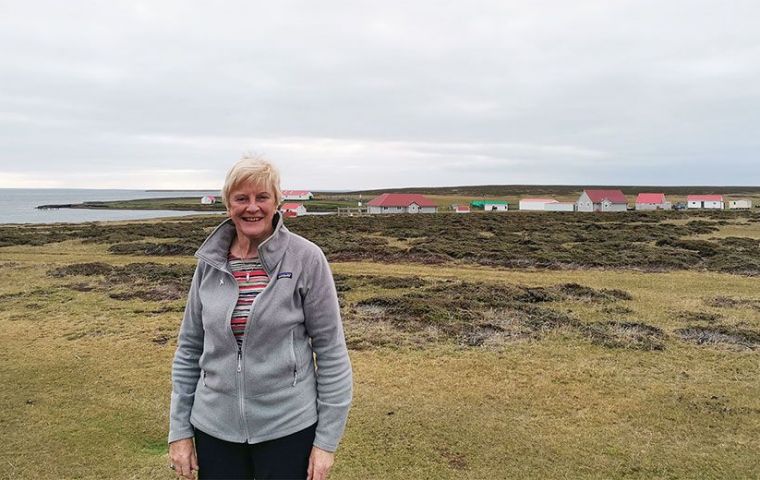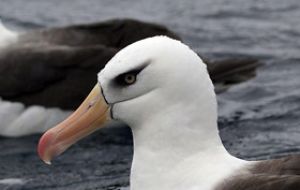MercoPress. South Atlantic News Agency
Falklands Conservation 2-year project to eliminate invasive species from New Island
 Phyl Rendell, commented: “Securing Darwin Plus funding to investigate the possible restoration program for New Island is a major step forward in the preservation of a key Falklands’ habitat”
Phyl Rendell, commented: “Securing Darwin Plus funding to investigate the possible restoration program for New Island is a major step forward in the preservation of a key Falklands’ habitat”  The black eye browed albatross have a pure white head with a black line over and through the eye, the “black brow”.
The black eye browed albatross have a pure white head with a black line over and through the eye, the “black brow”. Falklands Conservation (FC) has announced the launching of its new Darwin Plus-funded project for long-term restoration work on New Island Nature Reserve. New Island is one of the remotest islands in the Falklands archipelago, which runs a wildlife reserve and centre for scientific research, expected to considerably improve with the appointment of a new Bio-security and Invasives Manager.
Ross James, former Bio-security Officer for the Government of South Georgia & the South Sandwich Islands (GSGSSI), will lead the two-year project which aims to gather information regarding the possible removal of four introduced invasive species; rats,
feral cats, mice and rabbits from New Island.
New Island is an internationally significant wildlife site notable for its important populations of native birds, such as the world’s largest population of slenderbilled prion. This is recognized through its qualification as an Important Bird Area and Key Biodiversity Area (KBA), as well as through the recent designation of its inshore waters as a KBA for seabirds too.
But the invasive mammals, likely introduced in the early 1900s, threaten this valuable native wildlife and damage habitats. On New Island the endemic Cobb’s wren has been completely lost and the endemic tussac-bird is much less abundant than at other rodent-free sites in the Falklands.
Globally, the negative impacts of rats, mice and cats on birds are well recognized, with many examples of ecological recovery following their removal from island ecosystems. Predation by cats is a significant concern for the dwindling small white-chinned petrel colony at NI, one of only four in the Falklands.
Meanwhile, rabbits are preventing the recovery of native vegetation through grazing.
Over the course of the next two winter seasons, FC will investigate the best course of action for the future restoration of New Island by removal of the invasive species. This will involve trialing non-toxic bait to better understand which animals may eat the bait and the consequences, and to look at the most effective ways to safeguard native species. This will help ensure future restoration has the best chance of success.
Bolstering bio-security approaches through the project will also reduce the risk of new invasive species establishing and causing harm.
Ross comes to FC with considerable experience in bio-security management, having previously also worked as Bio-security Officer for the Falkland Islands Government from 2014-2018.
Subsequently, at GSGSSI, Ross was responsible for the continued bio-security of South Georgia, following the successful removal of mice and rats, completed in 2018.
FC has long been working to develop land management practices in the Falklands and as a result is committed to restoring and strengthening damaged habitats on its own land. Since its acquisition of New Island in 2020 through the incorporation of New Island Conservation Trust (NICT), one of FC’s primary goals has been to continue the good work begun by the NICT to restore New Island This project is funded through the Darwin Plus initiative, following a significant funding boost of £6.4 million from the UK Government for conservation work in the UK Overseas Territories.
FC welcome RSPB and the Falkland Islands Government Environmental Department as partners on the project.
Ross James, Biosecurity and FC begins new restoration project on New Island Nature Reserve Invasives Officer at FC, said: “Habitat restoration is something I’ve long been passionate about and the ecological recovery of South Georgia following its rodent removal was inspirational to witness. I’m excited to be joining Falklands Conservation and to be a part of New Island’s journey towards restoration. The myriad native wildlife on the New Island Nature Reserve face significant challenges from invasive species.
I look forward to working with the dedicated team at Falklands Conservation over the next two years to understand how we can best meet those challenges in the most effective and sensitive manner and protect New Island’s legacy as a wildlife haven.”
Mike Jervois, Biodiversity Protection Advisor at the Falkland Islands Government Environmental Department, said: “We are pleased to partner with Falklands Conservation on this ambitious new project. The investigatory aspects of this work are so important for informing the best methods for restoring ecosystems that have been severely impacted by introduced species.
“New Island is one of the most significant wildlife sites in the Falklands so we are confident that the planned habitat restoration work will have lasting biodiversity gains and set a new benchmark for what can be achieved. It addresses strategic objectives of the Environment Strategy, “to protect and enhance our biodiversity (ecosystem integrity), reducing its loss through tackling threats” and “to mitigate for degradation and promote restoration of native ecosystems”.
“In recognition of the importance of this project, the Falkland Islands Government are happy to contribute additional funding and staff time to ensure a successful outcome.”
Phyl Rendell, Trustee of NICT and landowner of Bleaker Island, commented: “Securing Darwin Plus funding to investigate the possible restoration program for New Island is a major step forward in the preservation of a key Falklands’ habitat. The wildlife on New Island has withstood the invasion of several introduced species over the years and their removal will assist the island’s environment to return to its original status.
“Following a rat eradication program on Bleaker Island three years ago, we have seen a significant increase in passerines and the penguin and cormorant colonies and tussac vegetation all look healthier. I am confident that New Island’s habitats will be world class when invasive mammals have been removed.” said Phyll Rendell. (Penguin News)




Top Comments
Disclaimer & comment rules-

-

-

Read all commentsThe invasive species was evicted in 1982 and will never be allowed to sprout up in the Falklands again,
Aug 05th, 2022 - 12:03 pm +2When are the European Conquistador Planters going to give Wallmapu back to the Mapuche, the rightful owners???
Aug 05th, 2022 - 10:11 pm +2https://en.mercopress.com/2022/06/21/ram-strikes-again-in-argentine-patagonia
Free Wallmapu, arm the Mapuche, one squatter one bullet.
Talking of invasive species
Aug 05th, 2022 - 11:54 pm +2https://falklandstimeline.files.wordpress.com/2020/08/12-04-02-imperialismos.jpg
Commenting for this story is now closed.
If you have a Facebook account, become a fan and comment on our Facebook Page!